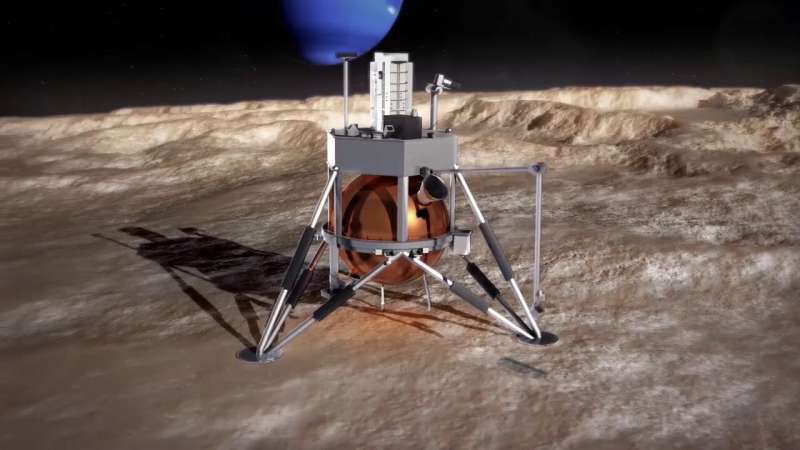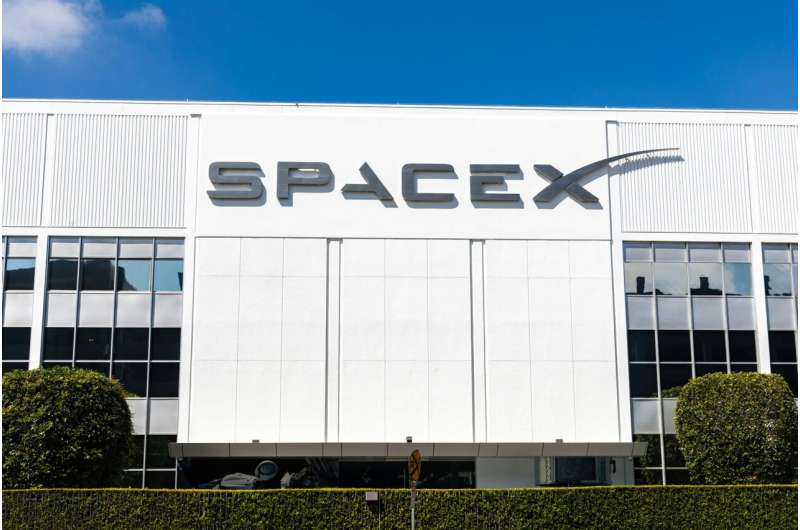Intuitive Machines seeks to take over NASA’s VIPER lunar rover
Tuesday, 13 August 2024 23:46

GMV Secures GBP 2 Million Contract for Quantum-Enabled White Rabbit Switch to Safeguard UK Infrastructure
Tuesday, 13 August 2024 21:58 GMV has been awarded a GBP 2 million contract by Innovate UK to develop the White Rabbit Switch, an advanced hardware solution designed for fiber-optic time distribution. This technology is crucial for enhancing the resilience of the UK's infrastructure. The project is part of Innovate UK's quantum-enabled positioning, navigation, and timing competition. GMV will spearhead the development, colla
GMV has been awarded a GBP 2 million contract by Innovate UK to develop the White Rabbit Switch, an advanced hardware solution designed for fiber-optic time distribution. This technology is crucial for enhancing the resilience of the UK's infrastructure. The project is part of Innovate UK's quantum-enabled positioning, navigation, and timing competition. GMV will spearhead the development, colla Northrop Grumman Completes Static Test of Digitally Engineered Rocket Motor
Tuesday, 13 August 2024 21:58 Northrop Grumman Corporation's (NYSE: NOC) digitally engineered large solid rocket motor has successfully undergone a static fire test at the U.S. Air Force Arnold Engineering Development Complex.
The test met all objectives, with performance data affirming the digital model and confirming the motor's capabilities. This accomplishment underscores the company's proficiency in meeting design
Northrop Grumman Corporation's (NYSE: NOC) digitally engineered large solid rocket motor has successfully undergone a static fire test at the U.S. Air Force Arnold Engineering Development Complex.
The test met all objectives, with performance data affirming the digital model and confirming the motor's capabilities. This accomplishment underscores the company's proficiency in meeting design BeZero Enhances Carbon Ratings Using Planet Labs Forest Data
Tuesday, 13 August 2024 21:58 Planet Labs PBC (NYSE: PL), a prominent provider of Earth data and insights, is collaborating with BeZero Carbon, a global ratings agency specializing in carbon markets. This partnership enables BeZero to utilize Planet's data to help market participants assess risk in carbon investments, transactions, and claims.
BeZero is the first to employ Planet's Forest Carbon Diligence product, whic
Planet Labs PBC (NYSE: PL), a prominent provider of Earth data and insights, is collaborating with BeZero Carbon, a global ratings agency specializing in carbon markets. This partnership enables BeZero to utilize Planet's data to help market participants assess risk in carbon investments, transactions, and claims.
BeZero is the first to employ Planet's Forest Carbon Diligence product, whic NASA C-20A Completes 150 Hours of Earth Science Flights
Tuesday, 13 August 2024 21:58 This summer, NASA's C-20A aircraft successfully completed over 150 hours of science flights across two months, collecting critical Earth science data despite various challenges. Operating internationally, the aircraft conducted missions across several countries in support of global research efforts.
Based at NASA's Armstrong Flight Research Center in Edwards, California, the C-20A has been
This summer, NASA's C-20A aircraft successfully completed over 150 hours of science flights across two months, collecting critical Earth science data despite various challenges. Operating internationally, the aircraft conducted missions across several countries in support of global research efforts.
Based at NASA's Armstrong Flight Research Center in Edwards, California, the C-20A has been A hopper could explore more than 150 km of Triton's surface in two years
Tuesday, 13 August 2024 19:27
Neptune's largest moon, Triton, is one of the most biologically interesting places in the solar system. Despite being hard to reach, it appears to have active volcanoes, a thin atmosphere, and even some organic molecules called tholins on its surface. However, Voyager only visited it once, in passing, 35 years ago.
Technology has advanced a lot in the intervening decades, and a new push for a lander on Triton specifically has been garnering attention. One such mission was described by Steve Oleson and Geoffrey Landis of NASA's Glenn Research Center.
Their concept mission, known as Triton Hopper, was funded by NASA's Institute for Advanced Concepts (NIAC) back in 2018 and utilized a cryogenic pump to extract propellant from Triton's surface to power a "hopper" that could travel up to 5 km a month, and do some fascinating science along the way.
The first challenge to any mission on Triton is getting there.
Terran Orbital removes Rivada constellation from revenue backlog
Tuesday, 13 August 2024 18:34

Lockheed Martin taps General Dynamics for solid rocket motor manufacturing
Tuesday, 13 August 2024 17:50

Can meteor showers be dangerous to spacecraft?
Tuesday, 13 August 2024 17:29
We've all read the advice that during a meteor shower there is no equipment needed. All you need to do is lay back and wonder at one of the most spectacular sights the universe has to offer. That's about it though and while you lay back on a lounger and watch, it really can be a wonderfully grounding and relaxing experience. Unless you happen to be on National TV and miss a meteor behind your head and just tell the world there's nothing to see. Not that I'm bitter about that of course.
It's quite easy to get confused; a meteor is a piece of rock that has fallen through the Earth's atmosphere and been destroyed on its way down, a meteorite survives the plunge and a meteoroid is a piece of space rock floating through space before it encounters the atmosphere. We can see meteors any night of the year and these are called sporadic meteors. However, around 20 times a year we can enjoy a burst of meteor activity in events known as meteor showers.
SpaceX's Elon Musk endorsed Donald Trump for president—what this could mean for US space policy
Tuesday, 13 August 2024 15:49
Elon Musk officially endorsed Donald Trump for president of the United States on July 13, 2024, shortly after Trump survived an assassination attempt. Musk, a billionaire technology entrepreneur, has made groundbreaking contributions in multiple industries, particularly space travel and exploration.
Even before Musk's endorsement, Trump was reportedly considering giving the billionaire an advisory role if elected for a second term. With Musk's public support and financial backing, it now seems even more likely that Trump would offer him an official position in his administration.
As someone who studies space and international relations, I am interested in how Musk might influence U.S. space policy if Trump wins in November. Their partnership could significantly shape the future of U.S. space exploration and defense, as well as shift the balance of power between the public and private sectors in space.
Current US space policy
A nation's space policy reflects its vision and priorities for outer space. U.S. space policy—a mix of continuity from past administrations and recent directives—is outlined in key documents, including the U.S.
Deep Blue Aerospace secures strategic funding, landmark VTVL rocket test soon
Tuesday, 13 August 2024 13:32
Wildfires rage across Athens
Tuesday, 13 August 2024 11:31 Image:
Image:
Firefighters in Greece are battling a rapidly spreading wildfire that has swept across several neighbourhoods in Athens, Greece, on Monday. Thousands of residents have been evacuated as the massive fire reached the suburbs of Athens, with some flames reaching heights of 25 m.
This image shows the fires surrounding Athens on 12 August 2024, captured by the Copernicus Sentinel-2 mission. This image has been processed in a way that highlights vegetation in red, while the burned areas can be seen in black. The estimated affected area exceeds 100 sq km.
In response to the fires, the Copernicus Emergency Management Service was
SpaceX announces new private mission on 1st human polar orbit spaceflight
Tuesday, 13 August 2024 11:11
SpaceX has lined up more business for its human spaceflight program with a private launch from Florida that will take its passengers on a polar orbit for the first time.
The mission called Fram2 that could launch from the Space Coast before the end of 2024 is headed up Chun Wang of Malta, according to a post on the SpaceX website. Wang is an entrepreneur who made a fortune in cryptocurrency and an avid adventurer.
Along for the ride will be fellow adventurers Eric Philips of Australia, Jannicke Mikkelsen of Norway and Rabea Rogge of Germany. Mikkelsen will take the role of mission commander and Philips the role of pilot.
SpaceX has flown 13 missions and 50 humans so far on its fleet of four Crew Dragon capsules, and was working on a fifth. It's unclear if Fram2 will fly on the new Crew Dragon, but it will feature a cupola attachment as opposed to the docking apparatus needed for when Crew Dragon spacecraft fly to the International Space Station.
The Crew Dragon Resilience flew with such an attachment, allowing for better views of space and Earth, when it took up billionaire Jared Isaacman for the first time on the Inspiration4 mission in 2021.





